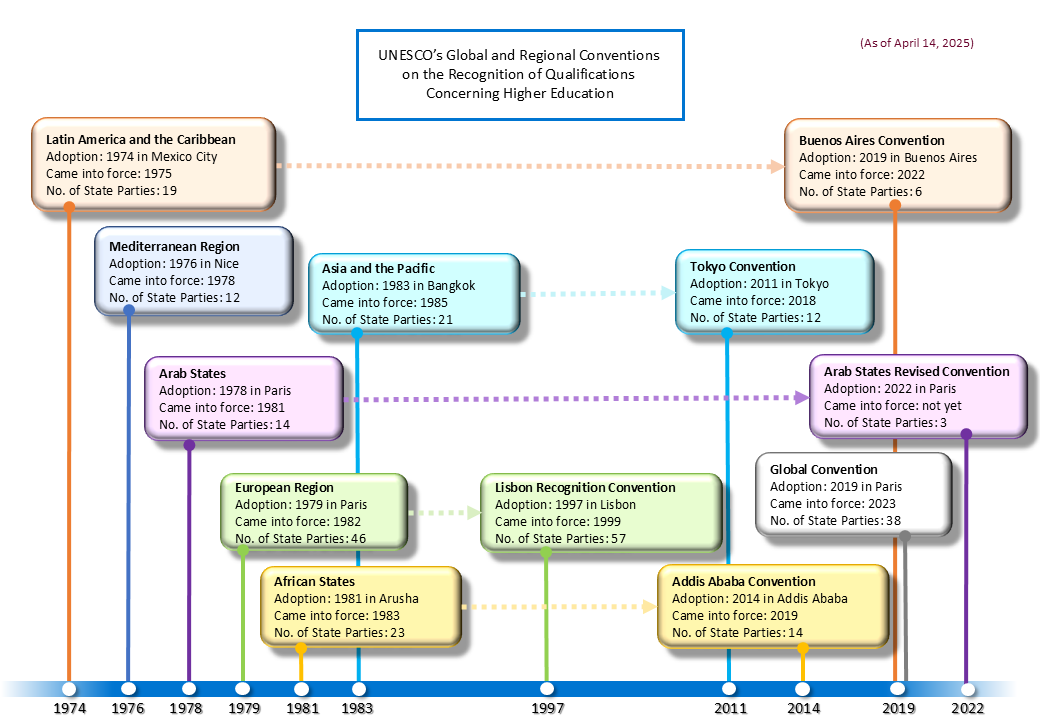UNESCO's Conventions on the Recognition of Qualifications Concerning Higher Education
About Us
- Our Mission
- Organization
- Survey, Research and References
- The Tokyo Convention on the Recognition of Qualifications in Higher Education and NIC Network of the Asia-Pacific Region (APNNIC)
- UNESCO's Conventions on the Recognition of Qualifications Concerning Higher Education
- Links to Related Organizations
- Our Mission
- Organization
- Survey, Research and References
- The Tokyo Convention on the Recognition of Qualifications in Higher Education and NIC Network of the Asia-Pacific Region (APNNIC)
- UNESCO's Conventions on the Recognition of Qualifications Concerning Higher Education
- Links to Related Organizations
Timeline of the Conventions on the Recognition of Qualifications Concerning Higher Education
Recent Accessions/Approvals/Ratifications
| 14 April 2025 | Republic of Korea ratified the Global Convention. (Effective from 14 July 2025) |
| 18 March 2025 | Bosnia and Herzegovina ratified the Global Convention. (Effective from 18 June 2025) |
| 23 December 2024 | Djibouti ratified the Global Convention. (Effective from 23 March 2025) |
| 10 December 2024 | San Marino ratified the Global Convention. (Effective from 10 March 2025) |
| 5 November 2024 | Mongolia ratified the Global Convention. (Effective from 5 February 2025) |
Regional Conventions
With the increasing global mobility in higher education since the 1970s, UNESCO has adopted and effectuated the six regional conventions taking the regional nature of higher education into consideration. The six conventions, concerning the importance of recognizing learning experience equally and fairly in another State, aim to promote recognition of higher education qualification (including qualifications for admission, diplomas, degrees and certificates). The revision process of these conventions has taken place since the late 1990s. 128 States have ratified one or more of these regional conventions as of April 14, 2025, with more than half of the States ratifying multiple conventions.
Links to Related Websites
- ユネスコにおける高等教育の資格の承認に関する規約について [Japanese only] (MEXT website)
- Higher education regional conventions (UNESCO website)
Global Convention
In response to further acceleration of globalization, the Global Convention on the Recognition of Qualifications concerning Higher Education was adopted at the 40th session of the UNESCO General Conference on November 25, 2019. The Global Convention provides an inclusive global framework for the recognition of qualifications in higher education, and it aims to facilitate global mobility in higher education as well as to promote and strengthen international cooperation. While the regional conventions and the Global Convention are mutually complementary and have many similarities, new provisions such as recognition of 'prior learning' and 'partial recognition' are included in the Global Convention. It requires 20 State Parties required for the Global Convention to enter into force have ratified the convention, and it became effective on March 5, 2023. 38 countries have ratified as of April 14, 2025.
| Note: Convention titles in Japanese are listed only for those translated and published by the MEXT. (As of April 14, 2025) | |||||
| Region | Convention Title | City of Adoption | Date of Adoption | Date of Entry into Force (Stipulating Article) | Number of State Parties |
|---|---|---|---|---|---|
| Global | Global Convention on the Recognition of Qualifications concerning Higher Education 高等教育の資格の承認に関する世界規約(訳文:PDF) |
Paris | 25 November 2019 | 5 March 2023 (Article XVIII) |
38 |
Background and Progress of the Global Convention
| 2023.7.4-5 | The first session of the Intergovernmental Conference of the States Parties to the Convention was held in Paris, France. |
| 2023.3.5 | The Convention came into force after having been ratified by the required twenty Member States. |
| 2020.9.13 | Japan ratified the Convention. |
| 2019.11.25 | Global Convention on the Recognition of Qualifications concerning Higher Education was adopted at the fortieth session of the General Conference of the UNESCO meeting in Paris, France. |
Links to Related Websites and Leaflets
- Higher Education (UNESCO website)
- Global Convention (APNNIC website)
- What is the Global Convention on Higher Education? (UNESCO website)
- Global Convention on Higher Education (UNESCO website)
- Global Convention leaflet (Downloadable from UNESCO website)
- A practical guide to recognition: implementing the Global Convention on the Recognition of Qualifications Concerning Higher Education (Downloadable from UNESCO website)

